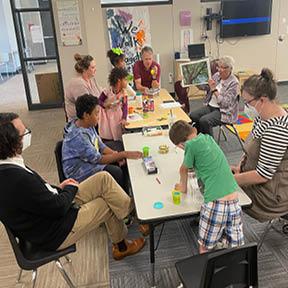|
Sunday, January 08 2023
During the summer of 2022 a team of listeners had 116 conversations with members of our congregation to hear your dreams and visions for the future of St. Paul’s. We heard many of you say you desire to “grow through vibrant ministry with children, youth, and families.” It would be wonderful if I ,the Family Ministry Director, had a magic wand to wave over our community and congregation and make this dream a reality in an instant. In reality, this will take hard work, and it will be hard work for all of us to take on. One way we can work together on this goal is through intergenerational ministry opportunities. Before we can dig into what this could look like we need to mention that “multi generational” and “intergenerational” are similar terms, yet have a different impact/vision. Multigenerational: Multigenerational ministry is accidental. Generations coexist within a congregation because of shared geography or family structures, not because of a shared mission or meaningful relationships. Accordingly, multigenerational churches often result in siloed generational segments with only limited interaction (Billy Kluttz, “Multigenerational Versus Intergenerational Ministry: What's the Difference?”) Intergenerational: Intergenerational ministry develops disciples and energizes churches by bringing together any combination of at least two generations in planned and purposeful settings; empowering multiple generations to mutually invest in each other and in their faith community; intentionally encouraging … relationships among multiple generations (Billy Kluttz, “Intergenerational Ministry: Why and How?”). Intergenerational ministry is intentional and is at the core of our baptismal vows for us as United Methodists. When a person is baptized a pastor will ask the following question to the congregation: “Will you nurture one another in the Christian faith and life and include these persons now before you in your care?” The congregation responds: “With God's help we will proclaim the good newsand live according to the example of Christ. We will surround these persons with a community of love and forgiveness,that they may grow in their trust of God, and be found faithful in their service to others. We will pray for them, that they may be true disciples who walk in the way that leads to life.” (From “The Services of the Baptismal Covenant of The United Methodist Church” as revised to align with the 2008 Book of Discipline and Book of Resolutions) Intergenerational is who we are as a people of The United Methodist Church, and particularly as St. Paul’s. Being an intergenerational community means that each of us, no matter our age, have something to contribute to another. It also means that we each have something to learn from one another. The chart below uses Erik Erikson’s theory of psychosocial stages to outline these needs in a church setting.
Erikson’s stages derived from https://www.simplypsychology.org/Erik-Erikson.html Intergenerational ministry is also about taking a look at what voices we hear the most. Are we hearing from Gen Z, Millennials, Gen X, Baby Boomers, and the Silent Generation? Are we hearing from marginalized groups? Does every age group have a place to serve according to their gifts and passions? Intergenerational ministry is a choice. It is also a hard choice. It means being intentional. “Intergenerational ministry is difficult to define because it is a philosophy of ministry rather than a program. Its goal is to strategically build significant and purposeful interactions between the generations within the structures of a church. The key components of intergenerational ministry are interaction and intentionality. Intergenerational ministry is more than bringing the generations into proximity with one another. It is intentionally building mutual and influential relationships with a degree of regularity between the various generations” (Ed Springer, An introduction to intergenerational ministry) Over the next few months, it is my hope that we can start to make the intentional choice through opportunities of intentional programs and gatherings. And, more than a hope it is my goal and plan to provide opportunities for us to move in this way. Does this mean that there’s not a place for age specific groups or programming? Of course not. “Establishing intergenerational community does not mean eradicating age-specific ministries. As important as it is to embrace intergenerational values at a core level, it’s also important to keep that in balance with age-specific ministry. We need to realize that exclusively age-specific ministry may be “working” to varying degrees, but has not proven sustainable for ongoing transmission of faith among young adults who have grown up exclusively in youth ministries. At the same time, all ages still need their own space to grow and develop at their own pace. Everyone needs to be part of a web of relationships that includes their peers AND members of other generations.” (Brad M. Griffin, Intergenerational ministry beyond the rhetoric) Intergenerational ministry for St. Paul’s means that we each have a hand in growing vibrant children, youth and family ministry. Becca Nims, St. Paul’s Family Ministry Director |






